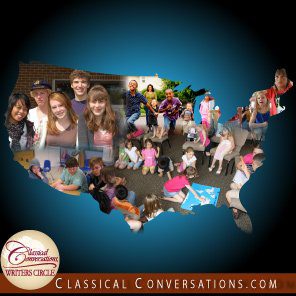What is the purpose of education? Are we educating our children for heaven or Harvard? What is our ultimate goal?
We are called to raise our children in the nurture and admonition of the Lord and that means more than just training them to perform a task or understand particular cultural norms in our society. It means training them to be free, to think, to love the Lord. It means training them to know how to learn, think, and act rightly in God’s world.
From now through February 8th, I will be traveling to Georgia, Alabama, Mississippi, Tennessee, North Carolina, Maryland, Pennsylvania, New Jersey, Connecticut, New York, Oklahoma, Illinois, and southern California to speak to families—within and without Classical Conversations—on the purpose of education and how classical, Christian education (and Classical Conversations, specifically) helps us to raise children who can learn, think, and act rightly in God’s world.
Classical, Christian education is a tried and true method to train children toward this noble end. Using the Trivium—a classical term for the three ways of learning—we train our children to use three of the arts that enable them to learn, think, and act rightly.
The first, the art of grammar, teaches children to memorize. They memorize facts and information that will be used in the other arts. They do this at a time when they enjoy repetition and chanting.
The second, the art of dialectic, teaches children to compare and contemplate the facts and information they have memorized. Through conversation, questions, and contemplation, they discover the truths that can be culled from this collection of facts.
The third, the art of rhetoric, teaches children to understand the truth rightly, to act on it, and to communicate it beautifully and persuasively to others. The student becomes the teacher.
Those familiar with Classical Conversations will recognize these terms, and they will recognize that these arts are practiced during stages of the child’s life when they are most interested in these things: memorization, discussion, and beauty. Classical Conversations teaches these arts in the corresponding programs: Foundations, Essentials, Challenges A and B, and Challenges I-IV. Through the process of memorization, conversation, contemplation, and acting and communicating, the students become adults who can and want to learn, think, and act rightly in God’s world.
Classical, Christian education, and Classical Conversations specifically, leads to some very important skills that may be lacking elsewhere and in other teaching methodologies. First, it leads to integrated learning. Being with the same group of children all day, with the same lead learner (the teacher or tutor), and studying all of the same subjects together, helps the students to make connections between the different subjects that are missed when they move from class to class, teacher to teacher, and classmates to classmates.
Seeing these integrated connections makes it easier for our students and children to see God as the Author and Creator of this world and all that is in it. The earth is the Lord’s and the fullness thereof. It also helps them to develop a Christ-centered worldview. Seeing God as the single, unifying Author of a diversity of subjects invites them to ask what God expects of His creation and how they are to use it rightly.
Classical, Christian education also requires community and conversation. The arts of dialectic and rhetoric, especially, require community and conversation. Dialectic is the art by which students argue, debate, discuss, and contemplate the connections between facts they have memorized and read. One needs partners to do this; it necessitates community. In the art of rhetoric, students are re-presenting and teaching others what they have learned. Their classmates and tutor become the audience and the critics for their rhetorical presentations. It makes the entire learning experience far more interactive.
This community, however, leads to diversity. It cannot be expected that every child in a group—even if studying the same text at the same pace—will be at the same level of understanding on a given subject. Thus, we should not be afraid to put them together and see how they learn and interact with others who are farther along in their studies or somewhat behind them in their studies. It teaches them to love their neighbor as a human being, not as a body carrying a computer that has input, processed, and can output the exact same information as they are. Of course, this community will then lead to fellowship, loving your neighbor will become bearing your neighbor’s burdens and experiencing the humbling love of your neighbor bearing your burdens.
A child, a student, a parent, a family that can learn, think, and act rightly is one who can live in diversity, loving one another as human beings, loving one’s neighbors, and mutually bearing one another’s burdens. This is a child trained for heaven, raised up in the nurture and admonition of the Lord.
Matt Bianco’s speaking tour will be shared via social media platforms like Facebook and Twitter using the tag #mattbiancocc. You can follow him on CC’s social media platforms by liking our Facebook page and following us on twitter, @ClassicalConv. If you would like exact dates, times, and locations for the events, please contact your local CC leadership.




